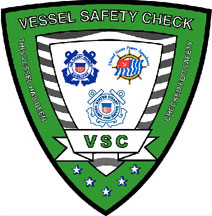Vessel Exams
Schedule your FREE Vessel Safety Check!

We'll make sure you have the right gear on board
At your request, Flotilla 59's certified vessel examiners will perform a vessel safety check - a free, voluntary, no-consequence review of the safety equipment on your boat.
If your boat passes the exam, you will receive a decal for your boat
that shows your commitment to safe boating to the public and to law
enforcement.
Use the contact form on our website to get in touch with one of our certified vessel examiners and schedule your vessel safety check. We are happy to examine your boat at the location of your choosing to include your home or any local marina.
Benefits of a FREE vessel safety check:
- Peace of mind - you'll feel much safer on the water with friends and family knowing you have all the right gear on board and in good condition.
- Be prepared for anything
- the list of safety gear identified on the Coast Guard's recreational
boating safety checklist is often above and beyond what is required by
most state boating laws to make sure that you have everything you could
possibly need for most any contingency.
- Stay on good terms with law enforcement - having an official vessel safety check decal on your boat shows the public and law enforcement your commitment to safe boating.
No penalty for "failures" - we're just here to help you be safe!
Our vessel safety checks are 100% free and voluntary, and confidential
with no penalties for "failures." We're here to help you be safe on the
water - that's all! If a piece of safety gear is missing we'll advise
you on where to find it so you can boat with confidence. Preventing
maritime loss of life and property is one of the primary missions of the
Coast Guard Auxiliary.
We strongly advise you to take advantage of this free service and are more than happy to answer any questions you may have.
Click here to Schedule your FREE VSC
What's involved in a vessel safety check?
Here's a few of the items that will be on our checklist when we perform a vessel safety check on your boat. For a complete list, please see the Auxiliary's virtual vessel exam page.
1. Registration Number
The boat's
registration number must be attached permanently to each side of the
forward half of the boat They must be plain, vertical, block characters,
not less than three (3) inches high, and in a color contrasting with
the background. A space or hyphen must separate the letters from the
numbers. Place your VA state tax sticker according to VA Department of Game and Inland Fisheries (DGIF) policy, which is illustrated here.
(e.g. VA 1234 AB or VA-1234-AB)
2. Registration/Documentation
Registration or documentation papers
must be on board and available. Documentation numbers must be
permanently marked on a visible part of the interior structure. Your documented boat's name and hailing port must be displayed on the
exterior hull in letters not less than four (4) inches in height. To be
documented, a boat must be 5 net tons or greater.
3. Personal Flotation Devices (PFDs)
You should have one wearable personal flotation device (more commonly known as a life jacket) for every person on your boat, plus at least one throwable PFD. All PFDs must be U.S. Coast Guard approved, in good serviceable condition, and of suitable size for the each person on the boat. Children must have properly fitted PFDs designed for children. Wearable PFDs and throwable PFDs must be "immediately available." PFDs should NOT be stored in unopened plastic packaging. For Personal Watercraft (jetski) riders, the PFD must be worn and indicate an impact rating. Boats 16 Feet or longer, must also have one Type IV PFD.
4. Visual Distress Signals (VSDs)
Recreational boats 16 feet and over used on coastal waters or the Great Lakes are required to carry a minimum of either:
- Three (3) day and three night pyrotechnic devices,
- One (1) day non-pyrotechnic device (flag) and one night non-pyrotechnic device (auto SOS light) or
- A combination of 1 and 2. Recreational boats less than 16 feet on coastal waters or the Great Lakes need only carry night visual distress signals when operating from sunset to sunrise.
For more information on types of visual distress signals please visit the U.S. Coast Guard Auxiliary's virtual vessel exam page.
5. Fire Extinguishers
Fire extinguishers are required if one of the following conditions exists:
- Inboard engine(s)
- Closed compartments that store portable fuel tanks
- Double bottom hulls not completely sealed or not completely filled with flotation materials
- Closed living space
- Closed stowage compartments that contain flammable materials
- Permanently installed fuel tanks
Fire extinguishers must be readily accessible and verified as serviceable. For more information on fire extinguishers and the types you may want/need to have on board, please see the Auxiliary's virtual vessel exam page.
You can find a complete list of everything we'll look for when examining your boat with graphics and illustrations by clicking here.